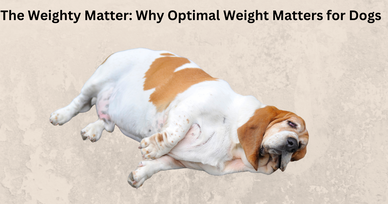|
As a dedicated canine physiotherapist, I am passionate about helping dogs live their best lives. One of the most fundamental aspects of a dog's well-being is often overlooked: maintaining a healthy weight. Weight management affects dogs’ overall health and longevity, as it does in humans. This blog will discuss the importance of weight management for dogs and the importance of education when it comes to this topic. The Weighty Matter: Why Optimal Weight Matters for Dogs Obesity in dogs has become a concerning epidemic in recent years. According to the Association for Pet Obesity Prevention, an estimated 59% of dogs (and interestingly 61% in cats in the USA) were classified as overweight or having obesity in 2022. This excess weight can lead to a multitude of health issues, from joint problems to cardiovascular diseases. As a canine physiotherapist, I have witnessed firsthand how maintaining an optimal weight can significantly improve a dog's quality of life. Joint Health and Mobility: Lighter Load, Happier Joints Research consistently shows that carrying excess weight puts a strain on a dog's joints, leading to conditions like osteoarthritis. A study published by Marshall et al 2010 found that obese dogs with osteoarthritis had noticeable improvement in their lameness after weight loss in the region of 6.10 – 8.85% of the dogs' body weight. Obesity can also put strain on ligaments such as the cranial cruciate ligament and predispose dogs to rupture or tears with obese canines being four times more likely to rupture a cruciate than non-obese ones! We can then conclude that lighter dogs experience less joint stress, allowing them to move with greater ease and comfort. Cardiovascular Health: A Healthy Heart on Four Paws Just like in humans, obesity in dogs can lead to cardiovascular complications. A study conducted by the University of Liverpool found that one in five obese dogs have metabolic syndrome and concluded that this 'syndrome occurs when a number of health problems, such as increased blood glucose and increased cholesterol levels, develop together, with the potential to increase the risk of other diseases, such as cardiovascular disease and diabetes.' Obesity not only affect the heart but also has an impact on the overall vitality of the dog. Maintaining a healthy weight reduces the risk of heart-related problems and keeps your canine companion active and full of energy. Lifespan and Longevity: Trim the Fat, Add Years to Their Lives Several studies have shown a direct link between a dog's weight and its lifespan. A groundbreaking research article published in the Journal of the American Veterinary Medical Association reported that dogs maintained at an ideal body condition lived an average of 1.8 years longer than their overweight counterparts. Those extra years are precious moments of companionship, joy, and shared experiences. The Holistic Approach: Combining Nutrition and Exercise Weight management isn't solely about reducing the number on the scale; it's about embracing a holistic approach that combines nutrition and exercise. Work closely with your treating health care provider to develop a tailored diet plan that meets your dog's nutritional needs without overindulgence. Incorporate regular exercise into your dog's routine, focusing on activities that match their age, breed, and physical condition. A Lighter Future for a Brighter Life As a passionate advocate for canine well-being, I urge every dog owner to prioritise weight management. A few extra kilos might seem insignificant, but the implications for your dog's health and happiness are profound. Joint health, cardiovascular wellness, and increased lifespan are all within your reach when you commit to maintaining your doggo at an optimal weight. Incorporate regular veterinary check-ups and consult with a canine physiotherapist to create a tailored weight management plan that addresses your dog's individual needs. By investing in their well-being today, you're ensuring a vibrant and fulfilling tomorrow. References: Marshall, W. G., Hazewinkel, H. A. W., Mullen, D., De Meyer, G., Baert, K., & Carmichael, S. (2010). The effect of weight loss on lameness in obese dogs with osteoarthritis. Veterinary Research Communications, 34(3), 241–253. Published online 2010 Mar 17. doi: 10.1007/s11259-010-9348-7 Salt, C., Morris, P. J., Wilson, D., Lund, E. M., & German, A. J. (2019). Association between life span and body condition in neutered client‐owned dogs. Journal of Veterinary Internal Medicine, 33(1), 89–99. Published online 2018 Dec 11. doi: 10.1111/jvim.15367 Tvarijonaviciute, A., Ceron, J. J., Holden, S. L., Cuthbertson, D. J., Biourge, V., Morris, P. J., & German, A. J. (2012). Obesity-related metabolic dysfunction in dogs: a comparison with human metabolic syndrome. BMC Veterinary Research, 8, 147. Published: 28 August 2012. doi: 10.1186/1746-6148-8-147 |
AuthorJoanna Whitehead Archives
June 2024
Categories
All
|



 RSS Feed
RSS Feed
